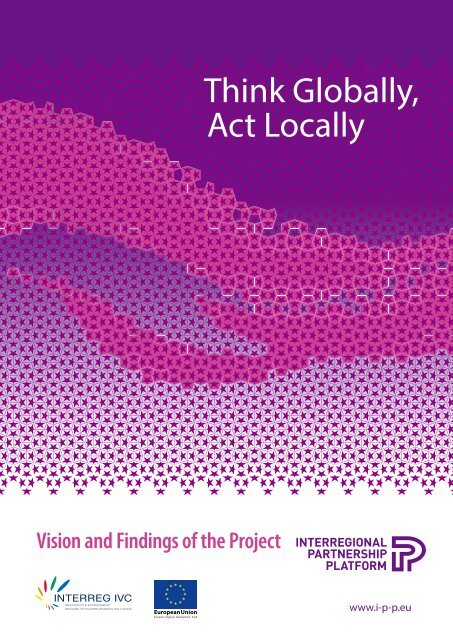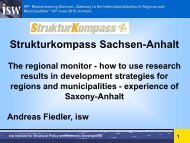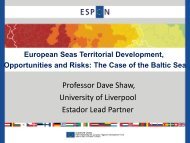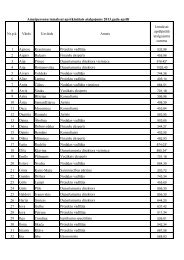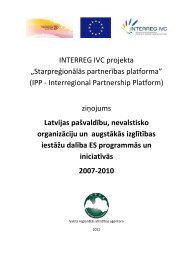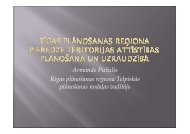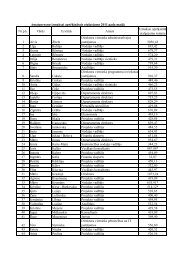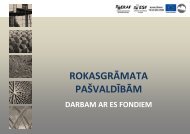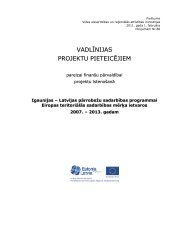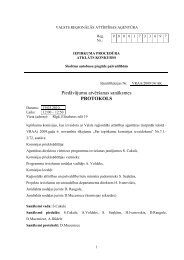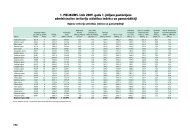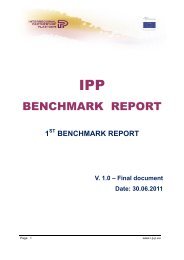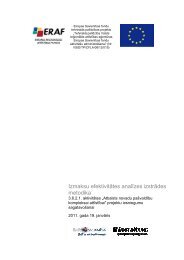Think Globally, Act Locally - Interregional Partnership Platform
Think Globally, Act Locally - Interregional Partnership Platform
Think Globally, Act Locally - Interregional Partnership Platform
You also want an ePaper? Increase the reach of your titles
YUMPU automatically turns print PDFs into web optimized ePapers that Google loves.
1<br />
<strong>Think</strong> <strong>Globally</strong>,<br />
<strong>Act</strong> <strong>Locally</strong><br />
Vision and Findings of the Project<br />
European Union<br />
European Regional Development Fund<br />
Greetings from Partner Regions<br />
www.i-p-p.eu
2<br />
Greetings from Partner Regions
1<br />
Table<br />
of Contents:<br />
Greetings from Partner Regions 2<br />
IPP Team and Cooperation Partners 5<br />
Benchmarking Study 3 10<br />
Pilot Project 1 12<br />
Pilot Project 2 14<br />
<strong>Act</strong>ion Plan 17<br />
Mainstreaming Seminar 21<br />
Final Conference 26<br />
Study Visits 31<br />
Illustrated History of IPP Project 34<br />
Greetings from Partner Regions
2<br />
If the regions evolve, Europe<br />
evolves as well<br />
This brochure accumulates a 3-year<br />
project experience and summarizes<br />
the main results achieved by joint<br />
efforts of the German, Hungarian<br />
and Spanish partners.<br />
In this edition one can find the best practice examples<br />
from the project.<br />
I would suggest several surveys for your attention:<br />
1. The Methodology for the Internationalization of Local<br />
Authorities.<br />
2. The <strong>Act</strong>ion Plan “Increasing Innovation Performance through<br />
<strong>Interregional</strong> Cooperation”.<br />
3. The Benchmarking Study 3, which identified the potential<br />
of future cooperation between Saxony-Anhalt, Észak-Alföld,<br />
Valencia and Latvia.<br />
Dear Reader!<br />
As the <strong>Interregional</strong> <strong>Partnership</strong> <strong>Platform</strong> (IPP) project has<br />
got into the closing stage, this brochure could be considered<br />
as an accountability point for all of us who were involved in<br />
the project.<br />
Three years have passed, therefore, we can evaluate the<br />
achievements. When we started this project, our aim was to<br />
promote the interregional cooperation with international<br />
partners. Nevertheless, we were interested in best-practice<br />
exchanges and the development of long-term networking.<br />
Today, we can admit that we have reached several goals. For<br />
example, the improvement of regional competitiveness and<br />
development, the transfer of interregional know-how among<br />
local and regional players and, certainly, a wide range of<br />
personal acquaintances and personal contacts.<br />
The brochure also offers the vision on how to transfer the good<br />
practices into internationalization policies, thus summarizing<br />
exchanges of various and valuable experiences.<br />
I hope this brochure will serve<br />
you as good reference point<br />
for expanding your institution’s<br />
international experience, thereforeflip<br />
the pages and get inspired to<br />
think globally, act locally!<br />
Solvita Zvidriņa<br />
Director of the State Regional Development Agency, Latvia<br />
Greetings from Partner Regions
3<br />
The IPP Project is based on two pilot projects and several<br />
workshops which helped to discover many new forms and<br />
ways of cooperation and to realize the crucial role of education<br />
and sharing experience. The five participating regions, which<br />
have a backlog demand to others in their countries, owe the IPP<br />
Project a sustainable development in the fields of education,<br />
economy and R&D. Thanks to these achievements the IPP Project<br />
attracts more and more supporters, investors and partners.<br />
The idea of IPP is ingeniously simple and simply<br />
ingenious. Why don’t we use each other’s knowledge<br />
for mutual development of regions? No sooner said than<br />
done. So IPP and collaboration of regions were born<br />
more than two years ago. By today, the project proved<br />
its worthiness numerous times.<br />
IPP promoted the internationality<br />
of different initiatives and<br />
enterprises, woke up the interests<br />
of stakeholders and supported the<br />
increase of regional export and the<br />
establishment of a common source<br />
of knowledge.<br />
As a result of the three benchmark studies, the newest stage<br />
of the IPP Project has been developed: the <strong>Act</strong>ion Plan which<br />
will serve as a guide for upcoming programs.<br />
This plan handles the problems which all the regions share<br />
as a “common challenge”, such as unfavourable demographic<br />
changes, different market opportunities, etc. These problems<br />
could be solved via a common base of knowledge and the<br />
sharing of experience besides an enhanced economical<br />
cooperation. The measure of innovation can be increased<br />
with mutual learning and aimed specialization. Implementing<br />
the <strong>Act</strong>ion Plan, an electronic system was developed. Thereby,<br />
development and innovation agencies of different regions can<br />
communicate freely and with ease. Furthermore, the <strong>Act</strong>ion<br />
Plan aims to make the participating regions more attractive<br />
for investors and jobseekers.<br />
Now in 2013 the IPP Project has a brand new opportunity to<br />
prove the success and necessity of borderless interregional<br />
collaboration. We are looking forward to see the results improve<br />
and to discover new advantages and methods along the way<br />
which will hopefully make this year a brilliant one for all of us.<br />
Prof. Dr. Birgitta Wolff<br />
Minister of Science and Economy of Saxony-Anhalt<br />
All these efforts had one goal: the mutual strengthening of<br />
the participating regions.<br />
Greetings from Partner Regions
4<br />
Last years cooperation among the partners of the IPP Project has<br />
proven that the original idea - brought up three years ago - was<br />
sound. As a follow-up of the Perspective project, we came to the<br />
conclusion that international cooperations should not be limited<br />
to regional authorities. We tried to involve as many interested<br />
entities from our regions as possible to show them the great<br />
possibilities in these collaborations. At the end of the IPP project<br />
I think we did succeed in this matter, we were able to start pilot<br />
projects, and regularly involve the local level in our partnerships.<br />
Dr. Norbert Grasselli<br />
Managing Director of INNOVA Észak-Alföld Regional<br />
Development and Innovation Agency<br />
The IPP project has allowed the main<br />
stakeholders to explore new paths<br />
for the internationalization, which<br />
has only been possible thanks to the<br />
high level of commitment of every<br />
actor in the project, further than the<br />
proper partners.<br />
The IPP Project has been identified, by the Valencian region, as<br />
a strategic tool that can help our territory reach the objectives<br />
of the Europe 2020 strategy to become a smart, sustainable and<br />
inclusive economy. These three EU priorities, which are expected<br />
to deliver high levels of employment, productivity and social<br />
cohesion, match with the Global Visión 2020 Strategy, which is<br />
been designed at regional level to make the region of Valencia<br />
a more thriving, attractive territory with a better quality of live,<br />
supported by the strategy of sustainable growth. This strategy<br />
will be based on the fostering of the entrepreneurial growth<br />
and the creation of job places, encouraging the innovating<br />
capacity of the enterprises and their internationalization.<br />
One of the main assets of this project has been the capability<br />
to involve and engage both local and regional authorities,<br />
enterprises, associations, etc. reaching ambitious and concrete<br />
achievements, such as regional and local summits, sectorial<br />
agreements, exchange of good practices and creation of<br />
common methodologies and platforms to develop sustainable<br />
actions, which will continue beyond the end of the project.<br />
Victoria Palau Tárrega<br />
Director General of European Affairs. Ministry of Presidency.<br />
Generalitat Valenciana Director de la Fundación Comunidad<br />
Valenciana Región Europea<br />
Greetings from Partner Regions
5<br />
IPP Team and Cooperation<br />
Partners<br />
Saxony-Anhalt<br />
Ministry of Science and Economy of<br />
Saxony-Anhalt<br />
Saxony-Anhalt is one of Germany’s<br />
16 federal lands. Duties of the<br />
Ministry of Science and Economy<br />
of Saxony-Anhalt include business<br />
development, innovation and science<br />
policy.<br />
Ministry of Science and Economy of<br />
Saxony-Anhalt<br />
4 Hasselbach Straße<br />
D-39104, Magdeburg<br />
Germany<br />
www.mw.sachsen-anhalt.de<br />
Magdeburg city<br />
Magdeburg is the state capital and<br />
seat of government of Saxony-Anhalt,<br />
however, little-known outside its federal<br />
land. Highlighting the unique feature<br />
of having two famous Ottos-Otto von<br />
Guericke (scientist) and Otto the Great<br />
(founder of the Holy Roman Empire) -<br />
in 2009 Magdeburg launched its branding<br />
campaign of Ottostadt (“City of Otto”) aimed<br />
to make Magdeburg recognizable. “Otto can<br />
do it!” sounds a Magdeburg-like answer.<br />
State Capital Magdeburg<br />
International Business Promotion Office<br />
10 Julius-Bremer Straße<br />
D-39090, Magdeburg<br />
Germany<br />
www.ottostadt.de<br />
EU Service-Agency<br />
The EU Service Agency is a consulting<br />
agency formed under the umbrella of<br />
the Investitionsbank Sachsen-Anhalt<br />
(Development Bank of Saxony-Anhalt). It<br />
offers actors and stakeholders in Saxony-<br />
Anhalt targeted support, both making them<br />
aware of the EU funding opportunities<br />
and facilitating their participation in such<br />
funding programs.<br />
EU Service-Agentur (EU Service Agency)<br />
Im Hause der Investitionsbank<br />
Sachsen-Anhalt<br />
Domplatz 12<br />
39104, Magdeburg<br />
Germany<br />
Tel.: +49 391 589 8380<br />
Fax: +49 391 589 1933<br />
E-mail: eusa@ib-lsa.de<br />
www.eu-serviceagentur.de<br />
tti Magdeburg GmbH<br />
The tti Magdeburg GmbH is a service<br />
provider mainly for SMEs. It offers services,<br />
mainly focused on innovation, which are<br />
important for strengthening of the economic<br />
efficiency of their clients jointly with selected<br />
external experts from universities, research<br />
institutions and companies.<br />
tti Magdeburg GmbH<br />
9 Bruno-Wille-Straße<br />
D-39108, Magdeburg<br />
Germany<br />
www.tti-md.de<br />
The EU academic network of<br />
Saxony-Anhalt (GERMANY)<br />
The EU Academic Network offers consultation<br />
and support for various researchers and<br />
research administrators at the universities.<br />
The EU Academic Network communicates<br />
information about EU research funding,<br />
provides support on proposal writing, project<br />
planning and management, etc.<br />
www.euhochschulnetz-sachsen-anhalt.de<br />
Martin Luther University Halle/Wittenberg,<br />
Zentrale Universitätsverwaltung, Abt.6.1<br />
Forschungsförderung und Wissenstransfer,<br />
10 Universitätsplatz<br />
06108, Halle/Saale<br />
Germany<br />
Reference person: Sigrid Köhne<br />
E-mail: sigrid.koehne@verwaltung.uni-halle.de<br />
Otto von Guericke University Magdeburg,<br />
Technology Transfer Centre<br />
2 Universitätsplatz<br />
39106, Magdeburg<br />
Germany<br />
Reference person: Martina Hagen<br />
E-mail: martina.hagen@ovgu.de<br />
Anhalt-Bitterfeld district<br />
Anhalt-Bitterfeld is a district in Saxony-Anhalt<br />
federal land, comprising some 175 thousand<br />
inhabitants. Its main industries include chemistry<br />
and pharmaceuticals, food, photovoltaics<br />
(Anhalt-Bitterfeld has Europe’s greatest<br />
concentration of photovoltaic companies!) and<br />
automotive/metal processing.<br />
www.anhalt-bitterfeld.de<br />
IPP Team and Cooperation Partners
6<br />
Észak-Alföld<br />
INNOVA Észak-Alföld Regional<br />
Innovation Agency<br />
INNOVA Észak-Alföld Regional<br />
Innovation Agency is an innovation<br />
centre in the region of Észak-Alföld<br />
that manages innovative ideas to<br />
market success by creating network<br />
between national and international<br />
actors. Beyond that INNOVA has a<br />
crucial role in the implementation of<br />
the Innovation Strategy of Észak-Alföld.<br />
In cooperation with regional experts<br />
the agency has developed the new<br />
regional innovation strategy in 2011.<br />
INNOVA Észak-Alföld Regional<br />
Innovation Agency<br />
4 Kürtös u.<br />
H- 4031, Debrecen<br />
Hungary<br />
E-mail: innova@eszak-alfold.hu<br />
www.innova.eszak-alfold.hu<br />
Szabolcs-Szatmár-Bereg County<br />
Regional Development and<br />
Environmental Management<br />
Agency (SzSzBC RDA)<br />
SzSzBC RDA is responsible for territorial<br />
development on the county level. Its main<br />
objectives are to foster the development<br />
of complex programs targeting territorial<br />
development, project generation and<br />
coordination. In order to reach these goals<br />
SzSzBC provides services to SMEs, local<br />
governments and the non-profit sector.<br />
SzSzBC RDA is a Europe Direct Information<br />
Point as well. The organization has remarkable<br />
experience in the fields of business and<br />
regional development, environmental<br />
management and regional marketing.<br />
Szabolcs-Szatmár-Bereg County Regional<br />
Development and Environmental<br />
Management Agency<br />
7 Benczúr tér<br />
H-4400, Nyíregyháza<br />
Hungary<br />
Email: info@szszbmfu.hu<br />
http://szszbmfu.eu<br />
Chamber of Commerce and<br />
Industry of Hajdú-Bihar County<br />
The Chamber of Commerce and Industry<br />
of Hajdú-Bihar County is the representative<br />
of the regional business community within<br />
the country and operates on the basis of<br />
voluntary membership. One of the most<br />
important objectives of the Chamber is to<br />
encourage the international activities of SMEs<br />
by having contacts with foreign and Hungarybased<br />
mixed chambers and also by providing<br />
them with information on foreign markets,<br />
consultation on foreign trade or helping them<br />
in organizing business meetings and trips.<br />
Chamber of Commerce and Industry of<br />
Hajdú-Bihar County<br />
10 Petőfi tér<br />
H-4025, Debrecen<br />
Hungary<br />
E-mail: hbkik@hbkik.hu<br />
www.hbkik.hu/index.php<br />
Észak-Alföld Regional<br />
Development Agency (ÉARDA)<br />
Agency’s aim is to facilitate the efficient use<br />
of regional resources, create partnerships<br />
between the public and private sphere, as<br />
well as to establish and cultivate domestic<br />
and international relations for development<br />
and prosperity. Generally ÉARDA’s target<br />
groups are the university and colleges<br />
of the region, regional enterprises and<br />
start-ups, research and development<br />
institutions, non-profit organizations, and<br />
local governments.<br />
Észak-Alföld Regional Development<br />
Agency<br />
31 Széchenyi u.<br />
H-4025, Debrecen<br />
Hungary<br />
E-mail: eszakalfold@eszakalfold.hu<br />
www.eszakalfold.hu<br />
Euro-Region House<br />
Since 1999 Euro-Region House has been<br />
playing a great role in raising awareness<br />
of local bodies, stakeholders and decision<br />
makers about participating in EU-funded<br />
projects. The company’s main objective is<br />
to provide up-to-date and reliable services<br />
and solutions to its proprietors about<br />
effective utilization of EU funds.<br />
Euro-Region House Non-profit Ltd.<br />
79 Piac u.<br />
H-4025, Debrecen<br />
Hungary<br />
E-mail: info@euroregio.hu<br />
www.euroregiohaz.hu<br />
Jászfényszaru city<br />
Being a rather small town of almost 6<br />
thousand people, Jászfényszaru hosts<br />
“Samsung Electronics” plant, which produces<br />
television sets. Employing over 2,000 people<br />
throughout the region, Samsung is one of the<br />
major employers in the Jászfényszaru area. For<br />
over 5 years, each June, the company has been<br />
organising Samsung day in Jászfényszaru –<br />
a one-day programme, comprising outdoor<br />
performances, concerts and entertainment<br />
open for all citizens. This practice is a good<br />
example of corporate social responsibility.<br />
Municipality of Jászfényszaru<br />
www.jaszfenyszaru.hu<br />
IPP Team and Cooperation Partners
7<br />
University of Debrecen<br />
Historically, the University of Debrecen<br />
is rooted in the Reformed College of<br />
Debrecen (founded in 1538). Having this<br />
heritage of over 470 years, the university is<br />
the oldest institution of higher education<br />
in continuous operation in Hungary. It<br />
is composed of 15 faculties and three<br />
agricultural research centres. University<br />
of Debrecen ranks among the top ones in<br />
Hungary on the basis of scientific potential<br />
and achievements.<br />
University of Debrecen<br />
www.unideb.hu<br />
Nyíregyháza city<br />
“Nyíregyháza offers more” is the slogan<br />
of Nyíregyháza, Szabolcs-Szatmár-Bereg<br />
county’s capital city. Having population of<br />
117 000, Nyíregyháza is the seventh largest<br />
city in Hungary.<br />
Municipality of Nyíregyháza<br />
www.nyiregyhaza.hu<br />
Jászság region<br />
The mission of Jászság is to become<br />
a competitive small region based on<br />
its traditions and on the cooperation<br />
among the innovative and structurally<br />
based industry, modern agriculture and<br />
sustainable tourism.<br />
Municipality of Jászság<br />
www.jaszsag.hu/angol/index.php<br />
Valencia and Paterna<br />
Fundación Comunidad Valenciana-<br />
Región Europea (FCVRE)<br />
The Fundación Comunidad Valenciana-<br />
Región Europea is a non-profit foundation<br />
aimed at strengthening the participation<br />
of the Valencian Region in the European<br />
Union’s policies and actions. It mainly<br />
works in the most relevant sectors for<br />
the development and improvement<br />
of the community life. The Fundación<br />
Comunidad Valenciana-Región Europea<br />
aims to promote knowledge on the EU<br />
opportunities and funding programs in<br />
all the institutional, economic, social and<br />
cultural fields of the Valencian Region.<br />
Fundación Comunidad Valenciana-<br />
Región Europea<br />
C/ En Bou, 11<br />
46001, Valencia<br />
Spain<br />
www.uegva.info<br />
Paterna is the third largest town in the<br />
region of Valencia. Located on the lefthand<br />
bank of the Turia river, Paterna<br />
is now embraced by the metropolitan<br />
area of the nearby Valencia city, which<br />
is located just 5 km southeast of it.<br />
The town enjoys the tranquility and<br />
traditions of a simple agricultural<br />
life combined with urban progress<br />
which has created large cultural and<br />
industrial spaces.<br />
With the slogan “Paterna, City of<br />
Business”, Municipality of Paterna<br />
is positioning the city as one of the<br />
most important business enclaves in<br />
Europe. It hosts the biggest and most<br />
modern fair in Spain.<br />
Municipality of Paterna<br />
1 Plaza Ingeniero Castells<br />
ES 46980, Paterna<br />
Spain<br />
E-mail: oficinaue@ayto-paterna.es<br />
www.paterna.es<br />
The Institute for Small and<br />
Medium Industry of the<br />
Generalitat Valenciana (IMPIVA)<br />
The Institute for Small and Medium<br />
Industry of the Generalitat Valenciana<br />
(IMPIVA) offers support for the direct<br />
participation of companies and organizations<br />
of the Valencia Region in EU strategic<br />
programmes on R&D and Competitiveness.<br />
IMPIVA hosts a large service network<br />
SEIMED (www.seimed.eu ) which stands for<br />
“Services for Companies and Innovation<br />
in the Spanish Mediterranean –<br />
Enterprise Europe Network”. It is a<br />
consortium that brings together the most<br />
appropriate organizations to provide a<br />
service close to the companies.<br />
Institute for Small and Medium Industry of<br />
the Generalitat Valenciana (IMPIVA)<br />
6 Pl. de l’Ajuntamento<br />
46002, Valencia<br />
Spain<br />
E-mail: info@impiva.gva.es<br />
www.impiva.es<br />
IPP Team and Cooperation Partners
8<br />
Latvia<br />
State Regional Development Agency<br />
State Regional Development Agency<br />
(SRDA) has been one of the most<br />
important players in the field of regional<br />
development in Latvia for more than<br />
10 years. The major part of the SRDA’s<br />
portfolio is composed of the research<br />
in regional development issues and<br />
the development of IT-services for<br />
stakeholders engaged in politics or<br />
economics. SRDA also conducts the first<br />
level control of the projects of Latvian<br />
partners approved within the framework<br />
of territorial cooperation and crossborder<br />
cooperation programs.<br />
State Regional Development Agency<br />
Elizabetes iela 19<br />
LV-1010, Rīga<br />
Latvia<br />
E-mail: pasts@vraa.gov.lv<br />
www.vraa.gov.lv<br />
Latvian Technological Center<br />
The Latvian Technological Center<br />
(LTC) is an innovation and technologyoriented<br />
business support structure – a<br />
business accelerator, which stimulates<br />
establishment and growth of knowledgebased<br />
SMEs by establishing relationships<br />
between research and industry as well as<br />
encouraging SMEs for technology transfer,<br />
local and transnational cooperation.<br />
Latvian Technological Center<br />
Aizkraukles iela 21<br />
LV-1006, Rīga<br />
Latvia<br />
www.innovation.lv/ltc<br />
University of Latvia<br />
The University of Latvia with its 17 000<br />
students, 13 faculties and more than 20<br />
research institutes is one of the largest<br />
comprehensive and leading research<br />
universities in the Baltic States. The Project<br />
Unit at the Development and Planning<br />
Department provides support and control<br />
for all European Social Fund and European<br />
Regional Development Fund co-financed<br />
research projects.<br />
University of Latvia<br />
Development and Planning Ddepartment/<br />
Project Unit<br />
Baznīcas iela 5<br />
LV-1010, Rīga<br />
Latvia<br />
www.lu.lv<br />
Rīga Planning Region<br />
Rīga Planning Region (RPR) is responsible<br />
for elaboration of development and<br />
planning documents on the regional<br />
level, initiation and implementation<br />
of international cooperation projects,<br />
coordination of the public transport<br />
network in the region.<br />
RPR hosts EU Structural Funds Information<br />
Centre which provides consultations<br />
to potential applicants about funding<br />
opportunities and conditions to facilitate<br />
socio-economic development of Riga region.<br />
Rīga Planning Region<br />
18 Zigfrīda Annas Meierovica bulvāris<br />
LV-1050, Rīga<br />
Latvia<br />
E-mail: rpr@rpr.gov.lv<br />
www.rpr.gov.lv<br />
Vidzeme University of<br />
Applied Sciences<br />
Vidzeme University of Applied Sciences<br />
(ViA) is an innovative regional academic<br />
and professional educational and research<br />
centre. Research being one of the priorities<br />
of the institution, ViA develops its own<br />
scientific traditions very purposefully.<br />
Vidzeme University of Applied Sciences<br />
Cēsu iela 4<br />
LV-4200, Valmiera<br />
Latvia<br />
www.va.lv<br />
Daugavpils city<br />
Daugavpils is a city, located on the banks<br />
of the Daugava River, from which the city<br />
derives its name („Daugavpils” literally<br />
means “Daugava Castle”). With a population<br />
of over 100 000, it is the second largest city<br />
in the country after the capital Rīga.<br />
Daugavpils has a favorable geographical<br />
position as it borders Belarus, Lithuania<br />
and Russia. Daugavpils is a major railway<br />
junction and industrial centre. There are<br />
several great metal-processing enterprises<br />
in Daugavpils, food production and light<br />
industries are well developed as well.<br />
Acknowledging the fact that provision of<br />
the information is a form of investment,<br />
Daugavpils municipality has aggregated<br />
information about all production<br />
enterprises of the city – their manufacturing<br />
capacity, export opportunities and interest.<br />
On-line and up-to date catalogue is to be<br />
found at home page: http://uznemumi.<br />
daugavpils.lv/home/project_en.htm<br />
Municipality of Daugavpils<br />
www.daugavpils.lv<br />
IPP Team and Cooperation Partners
9<br />
Zemgale Planning Region<br />
Zemgale Planning Region (ZPR) is a<br />
public regional institution which provides<br />
development planning, including<br />
elaboration of strategies and development<br />
plans as well as coordination of the<br />
implementation of these plans. ZPR too,<br />
hosts EU Structural Funds Information<br />
Centre, which provides consultations,<br />
seminars, training etc. for the potential<br />
applicants and project idea searchers.<br />
Zemgale Planning Region<br />
Katoļu iela 2B<br />
LV-3001, Jelgava<br />
Latvia<br />
E-mail: zpr@zpr.gov.lv<br />
www.zemgale.lv<br />
Baltic Environmental Forum - Latvia<br />
The Baltic Environmental Forum’s -<br />
Latvia main activity are projects dealing<br />
with fostering implementation of EU<br />
environmental policy in the Baltic states.<br />
Forum’s team works on different policy<br />
fields: energy efficiency, water quality &<br />
river basin management, chemical policy<br />
development, consumers awareness<br />
raising, nature conservation and Natura<br />
2000 implementation.<br />
Baltic Environmental Forum - Latvia<br />
Antonijas iela 3-8<br />
LV-1010, Rīga<br />
Latvia<br />
E-mail: bef@bef.lv<br />
www.bef.lv<br />
Valmiera Business and<br />
Innovation Incubator<br />
Valmiera Business and Innovation<br />
Incubator (VBII) promotes development<br />
of business in by supporting entrepreneurs.<br />
During the incubation process VBII offers<br />
new entrepreneurs office premises,<br />
infrastructure and contacts as well as<br />
consultations and services of business<br />
issues.<br />
Valmiera Business and Innovation<br />
incubator<br />
Purva iela 12A<br />
LV-4201, Valmiera<br />
Latvia<br />
E-mail: inkubators@vbii.lv<br />
www.vbii.lv<br />
Latvian Environmental<br />
Investment Fund<br />
The Latvian Environmental Investment<br />
Fund’s (LEIF) mission is to reduce<br />
environmental pollution, promoting<br />
the implementation of environmental<br />
protection projects and also to increase the<br />
capacity of municipalities and commercial<br />
organizations in preparation and carrying<br />
out qualitative and effective projects from<br />
their idea to realization.<br />
Latvian Environmental Investment Fund<br />
Ģertrūdes iela 10/12<br />
LV-1010, Rīga<br />
Latvia<br />
www.lvif.gov.lv<br />
Valmiera city<br />
Valmiera along with Cēsis are two leading<br />
cities in Vidzeme region, with Valmiera<br />
being the business centre of the region.<br />
Valmiera is an industrial city, one of the<br />
economically most active cities in Latvia.<br />
Approximately 1600 companies are located<br />
in a city of 27 040 inhabitants which places<br />
Valmiera above the average national level<br />
in terms of enterprises per inhabitants.<br />
The main industries are: chemical industry,<br />
food production, metalworking, trade,<br />
construction, furniture.<br />
Municipality of Valmiera<br />
www.valmiera.lv<br />
Cēsis city<br />
Being over 800 years old, Cēsis is one of the<br />
most “senior” cities in Latvia. “Where the past<br />
meets the future” says the slogan of this city,<br />
which intends to be the cultural and tourist<br />
centre in Vidzeme region.<br />
Municipality of Cēsis<br />
www.cesis.lv<br />
Culture and Tourism Agency of Cēsis<br />
www.tourism.cesis.lv<br />
IPP Team and Cooperation Partners
10<br />
Benchmarking Study 3<br />
“Reflection to Project Aims”<br />
During IPP lifetime, three benchmarking studies were developed:<br />
• Benchmarking study 1 (2011) “Current Situation of IPP<br />
Regions, Participation in EU Programs and Support<br />
Structures for Internationalization, Scope for Cooperation”<br />
• Benchmarking study 2 (2011) “Strategies for Successful<br />
Internationalization”<br />
• Benchmarking study 3 (2012) “Reflections on Project Aims”<br />
Full version of all studies is available at: www.i-p-p.eu<br />
Comparison of Main Data from Benchmarking Study 1<br />
(2010-2011) to Benchmarking Study 3 (2012)<br />
6.000.000<br />
5.029.601 5.117.190<br />
5.000.000<br />
4.000.000<br />
3.000.000<br />
2.000.000<br />
1.000.000<br />
0<br />
Valencia<br />
Population: Benchmarking Study 1 2011 Benchmarking Study 3 2012<br />
2.261.294 2.074.605<br />
2.356.219 2.313.280<br />
Latvia<br />
Saxony-Anhalt<br />
1.514.020<br />
1.492.502<br />
Észak-Alföld<br />
110<br />
88<br />
105.6 Mrd €<br />
102.9 Mrd €<br />
GDP: Benchmarking Study 1 2011 Benchmarking Study 3 2012<br />
85.59 Mrd €<br />
84.62 Mrd €<br />
66<br />
44<br />
22<br />
18.6 Mrd €<br />
20.1 Mrd €<br />
51.9 Mrd €<br />
48.3 Mrd €<br />
0<br />
Valencia<br />
Latvia<br />
Saxony-Anhalt<br />
Észak-Alföld<br />
Benchmarking Study 3
11<br />
30<br />
25<br />
20<br />
15<br />
10<br />
5<br />
0<br />
12.1<br />
Unemployment rate %: Benchmarking Study 1 2011 Benchmarking Study 3 2012<br />
27.2<br />
Valencia<br />
16.9<br />
13.8<br />
Latvia<br />
13.6<br />
11.6<br />
Saxony-Anhalt<br />
12.0<br />
14.5<br />
Észak-Alföld<br />
One of the most important things is that the Benchmarking Study 3 identified the potential fields of cooperation in existing<br />
industries. The interest shown by regions regarding interregional and international cooperation is in the following fields:<br />
Valencia<br />
Potencial field of<br />
cooperation<br />
Other existing<br />
industry<br />
Latvia<br />
Potencial field of<br />
cooperation<br />
Other existing<br />
industry<br />
Saxony-Anhalt<br />
Potencial field of<br />
cooperation<br />
Other existing<br />
industry<br />
Észak-Alföld<br />
Potencial field of<br />
cooperation<br />
Other existing<br />
industry<br />
Automotive industry and transport materials<br />
Bio technology<br />
Chemicals and plastics<br />
Construction<br />
Agriculture, Food and beverages<br />
Manufacturing, Industry, Mechanical engineering<br />
Medical technology<br />
Metal Sector<br />
Mining and quarrying<br />
Renewable energy<br />
Textile<br />
Tiling and ceramics<br />
Tourism and catering<br />
Transportation and storage<br />
Water supply; sewerage; waste management and remediation activities<br />
Wholesale and retail trade; repair of motor vehicles and motorcycles<br />
Wood and furniture<br />
Services<br />
Culture<br />
Information and communication technologies<br />
Benchmarking Study 3
12<br />
Pilot Project 1<br />
“EU Funds Advisory Service<br />
Agencies”<br />
Pilot Project 1 partners<br />
Pilot Project 1 brought together a circle of institutions related to EU funding schemes, namely: EU funds advisory service<br />
agencies for municipalities, business support organizations and universities.<br />
Among the objectives of the pilot project was the idea of optimizing networking among the agencies themselves and<br />
exchanging know-how about consortium building and partner search.<br />
Pilot Project 1 was launched in September 2011, at a kickoff<br />
meeting in Nyíregyháza (Észak-Alföld) and climaxed in<br />
October 2012 in Brussels, during a follow-up workshop at the<br />
week of Open-Days. It is worth stressing that at this workshop<br />
the cooperation went beyond the circle of the pilot project’s<br />
partners, namely, the workshop was joined by interested<br />
stakeholders outside the project team in order to develop<br />
very concrete joint project proposals for upcoming calls in such<br />
programs as “Intelligent Energy Europe”, “LIFE+” and “Europe<br />
for Citizens”. In this way, sustainability was ensured and a<br />
concrete step was taken to continue the cooperation beyond<br />
the end of the project.<br />
Pilot Project 1
13<br />
Network (www.euhochschulnetz-sachsen-anhalt.de) were<br />
happy to share the experience of their organization which<br />
was established exactly in order to provide information and<br />
consulting services in the area of research and innovation<br />
projects. The services offered by the network have received<br />
positive feedback by researchers, who stressed the high value<br />
Joint project idea generation<br />
As partner search is a commonly recognized as a difficult work,<br />
a good opportunity for stakeholders to get to know the pilot<br />
projects’ partners and probably to launch a joint project with<br />
them was already offered in June 2012 in Jūrmala (Latvia),<br />
when a session of three parallel workshops was organized, each<br />
of them dedicated to a particular category of EU funds advisory<br />
agencies: municipalities, business support organizations and<br />
universities.<br />
With regard to business support, Investment and<br />
Development Agency of Latvia (www.liaa.gov.lv), Institute<br />
for Small and Medium Sized Enterprises (www.impiva.es) and<br />
Szabolcs-Szatmár-Bereg County Regional Development and<br />
Environmental Management Agency (www.szszbmfu.hu)<br />
shared the experience of support measures to accelerate<br />
entrepreneurship and innovation development in their regions.<br />
The partners arrived to the consensus that the capacity of<br />
regions to innovate depends on a set of institutions, with<br />
business support agencies just being a part of it. Of crucial<br />
importance is the ability of these institutions (municipalities,<br />
universities, R&D centers, technology transfer centers etc) to<br />
establish, maintain and develop systematic joint work and<br />
coordinated action towards reinforcing innovative capability<br />
and competiveness of enterprises. <strong>Interregional</strong> cooperation<br />
provides opportunities to accumulate a critical mass of<br />
knowledge by exploiting the best practices from other regions.<br />
Universities discussing Match Making Matrix<br />
of consultancy and practical help of the agency. EU Academic<br />
Network is a good example of a strong commitment on the<br />
decision making level to ensure its successful functioning:<br />
namely, rectors of different universities are members of the<br />
board of the EU Academic Network. Moreover, the network<br />
itself cooperates intensively with the Ministry of Science and<br />
Economy of Saxony-Anhalt and maintains contacts with the<br />
national contact points of the EU programmes. Universities<br />
from across Germany conduct regular meetings to exchange<br />
experiences.<br />
Match Making Matrix – an instrument offered by<br />
EU Academic Network to ease cooperation between<br />
universitites and research institutes. Namely, information<br />
about universities’ experience, research areas, fields<br />
of interest in projects is accumulated on an on-line<br />
platform basis.<br />
Without doubt, education and research institutions are<br />
central to a knowledge-based innovation system. Since<br />
regional capacities could be strengthened, accessing each<br />
other’s knowledge assets instead of duplicating already<br />
existing infrastructure, a good example of this practice came<br />
from Saxony-Anhalt. The representatives of EU Academic<br />
Pilot Project 1
14<br />
Pilot Project 2<br />
“Internationalization Strategies<br />
for Local Authorities”<br />
In 2011 the partners signed Joint Declaration for the Development of Competitive Territories, to start working on the Pilot Project<br />
“Our municipalities participate in the IPP through the development of its Pilot Project 2“Local<br />
Strategy for Internationalization” <br />
We express the desire to promote local partnerships through effective coordination of our<br />
municipalities (at institutional and technical level) and our socio-economic actors (business<br />
community and associations).”<br />
Quotes from the Joint Declaration for the Development of Competitive Territories, signed by Anhalt-<br />
Bitterfeld and Magdeburg municipalities (Saxony-Anhalt), Jászság, Nyíregyháza and Jászfényszaru<br />
municipalities (Észak-Alföld), Paterna and Valencia (Valencia), Valmiera, Cesis and Daugavpils<br />
municipalities (Latvia).<br />
Pilot Project 2
15<br />
Within the project a Strategic Plan, or “Methodology, for the<br />
Internationalization of Local Authorities” was developed.<br />
Partners agreed on 8 steps in which internationalization is<br />
to be achieved. The methodology emerged as a summary<br />
of experience of IPP project, combined with the theoretical<br />
literature sources. It serves as a starting point, and each<br />
municipality or other stakeholder is free to adjust it for their<br />
particular use.<br />
Municipalities signing Joint Declaration for collaboration<br />
in Paterna, in November 2011<br />
Why internationalize?<br />
• to speed up innovation activities to increase competitiveness of entrepreneurs<br />
• to solve the challenges of ageing and shrinking population<br />
• to find smart niche based specialisations<br />
• to attract international population – investors, tourists<br />
• to learn from others’ good practices<br />
Internationalization in 8 Steps:<br />
Step 1:<br />
evaluate your assets – territorial capital. Territorial<br />
capital includes: location, natural resources, industrial<br />
territories and buildings (including unused); population<br />
(age structure, density, education and skills), business<br />
(number of enterprises, branches of economy).<br />
Step 2:<br />
define the goals of strategic development for municipality<br />
in midterm.<br />
Step 3:<br />
evaluate how interregional cooperation can contribute<br />
to achieving these goals?<br />
Step 4:<br />
answer the question, how broad to internationalize?<br />
Namely, decide, whether internationalization should be<br />
performed for the entire municipality or sectorally?<br />
Step 5:<br />
identify why internationalization is helpful? In what way<br />
should internationalization add up to your knowledge? What<br />
do you want to learn from international partners?<br />
Step 6:<br />
be clear, what do you want to achieve with internationalization<br />
in concrete terms on local, regional, national level?<br />
Step 7:<br />
identify your relevant partners, stakeholders, facilitators<br />
inside and outside of your municipality.<br />
Step 8:<br />
define how commitment in the administration will<br />
be generated? It is essential to achieve a consensus on<br />
decision-making level regarding the ways and areas of<br />
internationalization.<br />
See the full version of the methodology, containing complete theoretical approach and examples from IPP<br />
regions at: www.i-p-p.eu<br />
Pilot Project 2
16<br />
Partners are ready to think globally, act locally<br />
Moreover, partners shared regional good practices, among them:<br />
• Paterna “City of Business”: practice of bringing together all<br />
economic agents and local council to promote entrepreneurship<br />
• Magdeburg’s branding campaign of “City of Otto”<br />
• Jászság’s cultural thematic route development in rural areas<br />
• Daugavpils’s practice of using its world-known persons<br />
born in the city for the international visibility<br />
Magdeburg is unique in terms of having two Ottos: scientist Ottovon-Guerecke<br />
and founder of the Holy Roman Empire Otto the Great.<br />
On this fact, the claim of the branding campaign was based:<br />
Otto the Great<br />
Otto von Guerecke<br />
Magdeburg – City of Otto.<br />
Daugavpils, in turn, uses more than two famous personalities<br />
to associate their name with the city. One example is the<br />
Daugavpils-born artist Mark Rothko. An art centre named<br />
after him is under construction currently.<br />
Pilot Project 2
17<br />
<strong>Act</strong>ion Plan<br />
“Increasing Innovation Performance<br />
through <strong>Interregional</strong> Cooperation”<br />
Final adjustments to <strong>Act</strong>ion Plan are being made<br />
<strong>Act</strong>ion Plan (2013) is the final document within IPP project.<br />
The basis for its creation were three benchmarking studies,<br />
produced during the project’s lifetime, along with good<br />
practice accumulated in both pilot projects – “EU Funds<br />
Advisory Service Agencies” and “Internationalization<br />
Strategies for Local Authorities”.<br />
<strong>Act</strong>ion Plan was created as a guide for further cooperation,<br />
as one of the results of the IPP project was the recommendation<br />
to continue and expand the existing partnership.<br />
To start with, common challenges shared by all partner regions,<br />
were identified. To proceed, actions towards internationalization<br />
and innovation were suggested to address these challenges.<br />
Common Challenges in the Realm of<br />
Innovation and Internationalization:<br />
Challenge 1: to increase competitiveness and<br />
innovation performance.<br />
IPP partners have comparatively low regional competitiveness<br />
or ability to generate high and rising incomes and to improve<br />
livelihoods of the people living in the regions. Regions<br />
represented by partner institutions, are ranked from 127th<br />
to 237th positions (from total 268 regions) in EU regional<br />
competitiveness index 2010.<br />
<strong>Act</strong>ion Plan
18<br />
Challenge 2: to adapt to demographic changes and<br />
create secure, sustainable and competitive energy<br />
provision.<br />
Saxony-Anhalt, Latvia, Észak-Alföld, and to lesser degree -<br />
Valencia - are facing significant demographic changes, namely<br />
growing share of elderly and the shrinking portion of young<br />
people. A shrinking and ageing population requires new<br />
approaches to adjust specific infrastructures and has major<br />
consequences for the labor force and for its productivity.<br />
In addition all IPP regions face an energy challenge and share<br />
a need to develop secure, sustainable and competitive<br />
energy solutions.<br />
Challenge 3: to internationalize R&D&I.<br />
As the table above shows, IPP regions are ranked from 124th<br />
to 183rd positions regarding their strength in higher<br />
education, training and lifelong learning. Moreover, in all<br />
IPP regions, current imbalance exists between R&D spending at<br />
public and private level. The regions have common challenges<br />
to increase R&D expenditure in the business sector as<br />
well as to improve knowledge transfer to SMEs and large<br />
enterprises, thus promoting R&D activities in more applied<br />
and efficacious way. In order to compete globally, none of<br />
the IPP regions cannot rely only on their own knowledge<br />
base anymore.<br />
Challenge 4: to integrate enterprises and<br />
municipalities in global networks.<br />
IPP regions have limited market size potential; regions<br />
are ranked from 84th to 231st position in EU regional<br />
competitiveness index 2010. Therefore, it is of the upmost<br />
importance to internalize enterprises’ value and<br />
supply chains.<br />
Competitiveness Innovation Unemployment Higher Education, Training Market size<br />
and Lifelong learning<br />
Saxony-Anhalt<br />
127<br />
127<br />
10.9%<br />
124<br />
95<br />
Valencia<br />
165<br />
179<br />
12.10%<br />
159<br />
84<br />
Latvia<br />
216<br />
201<br />
14.30%<br />
133<br />
231<br />
Észak-Alföld<br />
237<br />
213<br />
9.70%<br />
183<br />
222<br />
Source: European regional competitiveness index 2010<br />
Proposed <strong>Act</strong>ions to Overcome<br />
the Challenges:<br />
<strong>Act</strong>ion 1: mutual learning for enhancing<br />
regional innovation capacity.<br />
In order to boost regional competitiveness and innovation<br />
performance, municipalities and regional development<br />
agencies should enhance their governance capacity of<br />
regional innovation systems. That implies redesigning of<br />
innovation policies towards smart specialization, taking into<br />
account the restraints imposed by limited budget, changes in<br />
demography and new energy requests. Under these conditions<br />
there is a natural interest in learning from each other and<br />
sharing experience, in particular in new fields that require<br />
further conceptual work.<br />
Instrument: peer reviewing and twinning of<br />
innovation policies.<br />
The aim of the instrument is to increase governance capacities<br />
of IPP regional innovation systems by creating inter-regional<br />
links among regional development and innovation<br />
agencies, oriented on mutual learning.<br />
<strong>Act</strong>ion Plan
19<br />
Best practice example: Leonardo Mobility<br />
for Internationalization of civil servants<br />
Lifelong Learning. Leonardo da Vinci Mobility projects<br />
are coordinated by Észak-Alföld Regional Development<br />
Agency (EARDA, www.eszakalfold.hu) in order to provide<br />
internship opportunities for partner organizations of<br />
the region to develop competences in international<br />
environment.<br />
Instrument: international workshops to develop<br />
e-government services.<br />
The aim of the instrument is to develop e-public service<br />
innovation. The main activities are to support IPP regions to codesign<br />
activities for common piloting public service innovations<br />
in e-government solutions and e-tools and to develop IPP<br />
regional capacities to take part in international projects that<br />
aim to increase public service innovations.<br />
Best practice example: project search<br />
IT tool at http://ipptool.eu/en<br />
IT-tool, created in IPP project, serves to ease getting in<br />
touch of stakeholders that focus on the same area of<br />
interest (energy, environment, health, information and<br />
communication technologies, innovation and research,<br />
interregional cooperation, security, social inclusion,<br />
employment and immigration, sports, tourism and culture,<br />
training and education, transport and city mobility, water<br />
management). Not only IPP project and cooperation<br />
partners, but every organization is free to register and<br />
post its proposal for cooperation on this website or<br />
look for the matching proposals already published!<br />
<strong>Act</strong>ion 2: cooperation of clusters for reaching<br />
global competitiveness and building<br />
international network of clusters.<br />
Taking into account the effects of globalization, which not<br />
only strengthen the competition between different locations<br />
but also offer new scope for business cooperation along the<br />
different value chains, trans-national cluster cooperation<br />
appears to be a new opportunity for growth.<br />
The main effort is made in (1) enhancing cooperation among<br />
cluster organizations of IPP regions in the fields of energy,<br />
medical technologies, pharmaceuticals, creative and culture<br />
industries, food, and tourism, and (2) integrating clusters into<br />
global cluster networks.<br />
Instrument: co-designing public services for SMEs<br />
export activities.<br />
Only 25% of SMEs currently export to markets inside and outside the<br />
EU. To help SMEs go international, they need the right information<br />
and support in markets within and outside the EU.<br />
The aim of this tool is to develop effective and resource efficient<br />
public services to increase export and innovation capabilities<br />
of SMEs. Ideally, the internationalization service provider should<br />
be based on the one-stop-shop principle to facilitate greater and<br />
easier access to SMEs, particularly for the smallest ones.<br />
Instrument: cluster marketing.<br />
The aim of the instrument is to create awareness of investment<br />
and job opportunities in IPP regions, thus attracting funds<br />
and talents to growing innovative clusters.<br />
Best practice example: Attraction of foreign<br />
investments for Daugavpils City (www.daugavpils.lv)<br />
The main activities conducted are participation in industrial<br />
international and regional exhibitions and organization of<br />
international business missions for local entrepreneurs.<br />
<strong>Act</strong>ion 3: long-term partnership framework for<br />
creating knowledge assets.<br />
Research infrastructure is central to knowledge-based innovation<br />
systems. Regional capacities could be built up by engaging partners<br />
in competitive research and innovation performance.<br />
Instead of duplicating research infrastructures, regions should make<br />
the most of each other’s research excellence. It would have more<br />
general role contributing to the circulation of “brains” and reducing<br />
the risk of brain drain while at the same time providing much-needed<br />
balance to the distribution of European research infrastructure.<br />
Instrument: building researchers’ network.<br />
The aim of the instrument is to strengthen intraregional ties among<br />
universities and research institutes to foster mobility of researchers.<br />
Best practice example: EU Academic Network Saxony-<br />
Anhalt (www.euhochschulnetz-sachsen-anhalt.de)<br />
EU Academic Network Saxony-Anhalt provides information,<br />
consulting, and project management services to support<br />
researchers in raising funds from the European Union and<br />
in executing EU research and innovation projects. As a result,<br />
universities of Saxony- Anhalt are expected to be more successful in<br />
gathering funding for their research. Target groups are researchers,<br />
research administrators, and steering boards of universities.<br />
<strong>Act</strong>ion Plan
20<br />
<strong>Act</strong>ion 4: interregionally connected<br />
universities and research institutes for talent<br />
attraction and retention.<br />
In order to attract and retain talents to mitigate the effects<br />
of population ageing and shrinking, cooperation among<br />
universities and research institutes should be increased.<br />
A globally connected university or research institute acts as<br />
a ‘window’ to the region and builds and enhances the image<br />
and reputation of the region in the wider world.<br />
Instrument: cooperation projects among<br />
universities and research institutes.<br />
The aim of the instrument is to stimulate an increased exchange<br />
between higher education institutions and research institutes of<br />
IPP regions focusing on excellence in teaching and in education<br />
development. The cooperation will grant opportunities for<br />
academic teaching and researcher staff to teach at foreign<br />
higher education institutions.<br />
<strong>Act</strong>ion 5: development of local regional<br />
partnerships among municipalities.<br />
The main instruments for building local and regional<br />
partnerships among municipalities and regional institutions<br />
are the integration of internationalization in sectoral or<br />
horizontal policies as well as providing information and<br />
guidance for support of internationalization.<br />
Instrument: city branding.<br />
The aim of the instrument is to create awareness of investment,<br />
tourism and living opportunities in IPP regions.<br />
Best practice example: “Paterna, City of Business”<br />
(www.paterna.es)<br />
Brand “Paterna, City of Business” is created by city council in<br />
close cooperation with local industry. The brand is used to<br />
promote the city as the biggest business enclave in Spain.<br />
Best practice example: “Match Making Matrix”<br />
(www.euhochschulnetz-sachsen-anhalt.de)<br />
Improvement and extending of the matrix developed by<br />
the EU Academic Network of Saxony-Anhalt. The matrix<br />
presented by the EU academic network representatives<br />
should be made available on an online platform<br />
(e.g. Google Docs) and all IPP, etc. universities are invited<br />
to contribute information about their experience, research<br />
areas, interregional research projects, fields of interest.<br />
Instrument: methodology for internationalization<br />
strategies for local authorities.<br />
The aim of the instrument is to help local municipalities<br />
and regional agencies adopt a more planned and more<br />
strategic approach to internationalization. This tool offers<br />
methodological guidelines to develop internationalization<br />
strategies for local authorities and is available for free use<br />
and inspiration at website www.i-p-p.eu.<br />
Instrument: student mobility network.<br />
The aim of the instrument is to attract and retain new talents<br />
to IPP regions. Clear targeting of talent with specific sectoral<br />
skills can help build up a critical mass, which in turn can act as<br />
an attractor of other individuals and businesses.<br />
Best practice example: Debrecen Summer School<br />
(www.nyariegyetem.hu)<br />
Best practice example: “Common Internationalization<br />
strategy for Valmiera, Cēsis and Smiltene”<br />
The goal of common internationalization strategy is to<br />
increase competitiveness at international level. Three<br />
action lines are highlighted: (1) improve business<br />
environment and attract foreign investments; (2) city<br />
marketing; (3) enhancement of municipalities governing<br />
capacities for internationalization activities.<br />
Debrecen Summer School (Észak-Alföld) specialises<br />
in organising Hungarian language courses for foreign<br />
students. Launched at seven distinct levels in practically<br />
each month of the year, various courses offer 40, 50, 60,<br />
80 or 120 h language classes. In the year 2011 about<br />
1000 students learned Hungarian language, culture and<br />
history at the Debrecen Summer School. There are about<br />
30 teachers working at the Summer School, mainly from<br />
the University of Debrecen.<br />
The full and up-to-date version of <strong>Act</strong>ion Plan is<br />
available at www.i-p-p.eu.<br />
<strong>Act</strong>ion Plan
21<br />
Mainstreaming Seminar<br />
“Gateway to Internationalization<br />
in Regions and Municipalities”<br />
The seminar took place in Jūrmala (Latvia) on June 14, 2012 and<br />
was attended by more than one hundred policy planners and makers<br />
at local, regional and national level, along with representatives<br />
from business development organizations, universities and NGOs.<br />
The main focus of the event was on discussion about how good<br />
practices from IPP regions could be included and therefore<br />
mainstreamed into their future regional development programs.<br />
Jekaterina Beļajeva (Jūrmala City Council, www.jurmala.lv),<br />
welcoming Latvian and international guests to Jūrmala, gave an<br />
overview of this famous resort city, revealing Jūrmala’s future<br />
and investment plans.<br />
In his presentation Rafael Escamilla (IMPIVA, www.impiva.es)<br />
spoke about cooperation between companies and innovation<br />
intermediaries in Valencia. IMPIVA (Institute for the Small<br />
and Medium Sized Enterprises), being in charge for the<br />
implementation of industrial policy in Valencia, administers<br />
financial aid programs (grants), provides technical infrastructure<br />
for Innovation support and offers services for enterprises. In<br />
Valencia, internationalization and business innovation are<br />
regarded as the main means to achieve the goal of improving<br />
productivity and competiveness of local enterprises.<br />
Thomas Micka (tti Magdeburg, www.tti-md.de) commented<br />
on results obtained from Pilot Project 1, giving an insight into<br />
experiences and concepts for cooperation among EU service<br />
agencies. He stated that partners shared a high appraisal of<br />
dissemination events such as Regions Day, webinars/online<br />
conferences, staff exchange between partners etc. Such fields<br />
as renewable energy, eco innovation/eco design and waste<br />
management are regarded among the partners as those with<br />
the highest potential for joint future projects.<br />
José Antonio Redorat (Valencian Federation of<br />
Municipalities and Provinces, www.fvmp.es) spoke about<br />
what internationalization means for local authorities. He is<br />
convinced that irrespective of their size, all municipalities<br />
can benefit from networking and being involved in the<br />
Mainstreaming Seminar
22<br />
international arena. From various forms of internationalization,<br />
each municipality should use the most appropriate for them.<br />
Dita Trapencere (Cēsis City Council, www.cesis.lv) was<br />
speaking about Vidzeme region economical development<br />
territory – a triangle composed between Cēsis, Valmiera and<br />
Smiltene cities, and expressed her satisfaction about three cities’<br />
ability to come to an agreement about local cooperation for<br />
internationalization. Finding each city’s particular strength<br />
and putting emphasis on its development, partners don’t<br />
rival, but rather supplement each other: Cēsis being the<br />
cultural, Valmiera being the industrial, and Smiltene being<br />
the agricultural heart of the region.<br />
Andreas Fiedler (ISW Institute for Structural Policy and<br />
Economic Development, www.isw-institut.de) shared<br />
Saxony-Anhalt’s experience of using research results in<br />
developing strategies for regions and municipalities. For<br />
this purpose, the region has created Strukturkompass<br />
(www.strukturkompass.de) – a collection of data on regional<br />
development. Strukturkompass contributes to efficient<br />
administration by providing accurate data, supporting<br />
strategic decision making.<br />
Thomas Wobben (Committee of the Regions Directorate E,<br />
http://cor.europa.eu) gave a view of the Committee for the<br />
future development of territorial cooperation in the EU. He<br />
explained that the Committee of the Regions is an Advisory<br />
body representing local and regional authorities at EU level.<br />
Nowadays reality is that national policies have less and<br />
less influence on economic and regional development,<br />
whereas in turn local and regional authorities have more<br />
responsibilities in the EU policy. In order to deliver effective<br />
policy, it is necessary to cross the traditional administrative<br />
boundaries and national frontiers, therefore – foster territorial<br />
cooperation across the EU.<br />
Daina Krīviņa (Daugavpils City Council, www.daugavpils.lv)<br />
revealed Daugavpils’s municipality experience in achieving<br />
developmental goals through internationalization. She<br />
explained that participation in Pilot Project 2 helped the<br />
city to develop its Internationalization <strong>Act</strong>ion Plan, with a<br />
part of activities included in city’s Development Program<br />
Investment Plan 2012-2014. It includes such activities as<br />
municipality’s support to city marketing activities, international<br />
events for improvement of business environment and attraction<br />
of investors. A rapid elaboration of section “Invest in Daugavpils”<br />
at city’s homepage is a good example of city’s openness to<br />
internationalization: http://www.daugavpils.lv/en/348.<br />
Ilze Goba (Ministry of Regional Development and<br />
Environmental Protection, www.varam.gov.lv) gave an<br />
overview of Latvia’s regional policy priorities till 2020, which<br />
foresees European Territorial Cooperation to be one of the<br />
implementation tools and source of financing for regional<br />
and local projects. Key support directions include developing<br />
transport infrastructure, business infrastructure (industrial sites,<br />
communications), provision of public services and specific<br />
support in realms such as renewable energy, creative industries,<br />
tourism and cultural heritage etc.).<br />
Mainstreaming Seminar
23<br />
by Valencian Regional Government in 2003, acts as a broker of<br />
partnership, playing an active role for the internationalization<br />
through EU programs as well.<br />
In the frame of IPP project, FCVRE created an IT-tool served<br />
to ease getting in touch with stakeholders that focus on the<br />
same area of interest: http://ipptool.eu/en. The IT-tool searches<br />
information about EU funding for such areas as energy, innovation<br />
and research, tourism and culture, training and education etc.<br />
Burkhard Fieber (State Chancellery of Saxony-Anhalt,<br />
www.sachsen-anhalt.de) explained about the good practice<br />
of grant program “Saxony-Anhalt <strong>Interregional</strong>” which aims<br />
at promotion of interregional cooperation by ERDF and ESF.<br />
The grant program was initiated to deal with improving the<br />
quantity and success rate of project applications, development<br />
of human resources through knowledge transfer, contribution<br />
to internationalization of public bodies.<br />
José Luis Muňoz (FCVRE, www.uegva.info) shared Valencia’s<br />
experience in involvement of regional and local stakeholders<br />
in interregional cooperation. FCVRE (Fundación Comunidad<br />
Valenciana – Región Europea) is an example of public-private<br />
partnership, which unites public bodies (regional government,<br />
municipalities, universities, research institutes) from one side and<br />
private entities (banks, chambers of commerce, business and<br />
entrepreneurial associations etc) from the other. FCVRE, created<br />
István Oláh (Szabolcs-Szatmár-Bereg County Development<br />
Agency, www.szszbmfu.hu) shared the agency’s experience<br />
in cross-border cooperation programs and revealed its plans<br />
regarding fulfilling county’s regional development policy’s<br />
priorities, such as energy and tourism (with either specified<br />
target groups like senior tourism, or specified attraction,<br />
like gastronomic tourism, health and bath tourism), waste<br />
management etc.<br />
Mainstreaming Seminar
24<br />
Panel Discussion<br />
The presentations of lecturers and IPP partners were followed<br />
by a panel discussion “How good practices of IPP regions<br />
can be included and mainstreamed into their future<br />
internationalization strategies?” Experts at panel discussion<br />
were invited to to discuss their region’s main priorities for the<br />
next programming period and to suggest their ideas on<br />
internationalization.<br />
Jūlija Jakovļeva (Ministry of Environmental Protection and<br />
Regional Development) stated that Latvia is primarily<br />
interested in infrastructure and cross-border cooperation<br />
projects, and the same applies to Észak-Alföld region.<br />
With regard to Saxony-Anhalt, Burkhart Fieber stressed the<br />
importance of investments in growth and employment and<br />
of the ties between research and business.<br />
For José L. Muñoz (Valencia), the main growth priorities<br />
include the development of research, SMEs, transportation<br />
and mobility, as well as networking among innovation actors.<br />
At the end, all panel discussion participants arrived at the consensus,<br />
that either cross-border, or interregional, cooperation is very essential<br />
for solving common issues shared by the partner regions – starting<br />
from demographical challenges and ending with renewable resources.<br />
All presentations are available at www.i-p-p.eu<br />
Jūrmala is the largest resort city in the Baltics. The city owns 26 km long beach<br />
Mainstreaming Seminar
25<br />
Mainstreaming Seminar
26<br />
Final Conference<br />
“Key Strategies for the<br />
Internationalization: Innovation<br />
and <strong>Interregional</strong> Cooperation”<br />
The Final Conference of IPP project was held in Valencia on<br />
November 29, 2012.<br />
The conference was honored by the participation of high level<br />
representatives from Committee of the Regions, the European<br />
Commission, the INTERREG IV C Program Office, along with local and<br />
regional governments and other public and private stakeholders<br />
from IPP regions. In total more than 150 people attended the<br />
conference. The aim of the event was to discuss the perspectives of<br />
interregional cooperation in context with the competitiveness<br />
policies in EU and to reflect the main results of the IPP project.<br />
The conference started with the welcoming speech of Máximo<br />
Buch Torralva, the Minister of Economy, Industry and Commerce<br />
of Valencia and Reiner Haselhoff, Minister-President of Saxony-<br />
Anhalt. They stated that both Valencia and Saxony-Anhalt already<br />
share a history of successful cooperation in the field of innovation<br />
and internationalization. Both regions have already initiated<br />
cooperation between governmental institutions, municipalities,<br />
universities etc.<br />
The conference went on with the insight into the new planning<br />
period 2014-2020. Thomas Wobben (Committee of the Regions<br />
Directorate E) who happened to be also IPP project idea’s author,<br />
presented European strategies and upcoming policies for the<br />
interregional cooperation. He started with noting that basically all<br />
EU member states currently are facing challenges in meeting Europe<br />
2020 targets, particularly in R&D investment and tertiary education.<br />
Therefore, the challenges for local and regional authorities have<br />
dramatically increased. <strong>Interregional</strong> cooperation can help to<br />
address these challenges in providing new ideas and co-operation<br />
partners, however, EU support for interregional co-operation<br />
will not be sufficient, therefore it needs to be combined with<br />
local and regional funding policies and strategies.<br />
Final Conference
27<br />
The latest proposals for European territorial cooperation<br />
foresee, a total amount of EUR 8.728 million (reduction of 1.086<br />
million EUR), which should be allocated as follows:<br />
• EUR 6.422 million for cross-border cooperation (decrease<br />
of 834 million EUR)<br />
• EUR 1.806 million for transnational cooperation (decrease<br />
of 252 million EUR) and<br />
• EUR 500 million for interregional cooperation<br />
• Co-financing rate for territorial co-operation should rise<br />
to 85% (+10%)<br />
What Can <strong>Interregional</strong> Co-operation Do?<br />
Traditional answers:<br />
New answers:<br />
exchange best practices<br />
promote co-operation and internationalization<br />
of local/regional actors<br />
find joint solutions<br />
improve strategies and practices<br />
Find efficiency gains in regional development by interregional co-operation and benchmarking<br />
Promote mobility and co-operation of public sectors (employment, education, innovation services)<br />
Strengthen of co-operation of business and innovation services<br />
Develop new business and financing models for public services<br />
Thorsten Kohlisch (IP Coordinator & Project Adviser INTERREG IVC Information Point East) explained about the envisaged<br />
future of interregional cooperation.<br />
The Future of <strong>Interregional</strong> Cooperation<br />
March 2010<br />
EU2020 strategy<br />
October 2011<br />
draft regualtion<br />
June 2012<br />
INTERREG “5C” Programming Committee set up<br />
adaption of legislative package & agreement on budget post 2013<br />
End 2013<br />
submission of the programme to the EC<br />
1 st half 2014<br />
approval of the programme by the EC<br />
2 nd half 2014<br />
launch of the 1 st call?<br />
Final Conference
28<br />
Two scenarios currently discussed for the future of<br />
INTERREG programme:<br />
1. Improved integrated program (similar to IVC)<br />
• No revolution: INTERREG philosophy kept<br />
• Improvements & simplification (e.g. 1 type of project only)<br />
2. Support program to national /regional Operational Programs<br />
under the investment for growth and jobs goal:<br />
• More fundamental change (less bottom up)<br />
• ‘Service provider’ to Managing Authorities<br />
Round Table about Pilot Project 1<br />
The conference continued with presentation of the main results<br />
of IPP project. Experiences were shared by representatives<br />
from IPP partner institutions, namely, Thomas Steinmetz<br />
(Ministry of Science and Economy of Saxony-Anhalt), José Luis<br />
Muńoz (Fundación Comunidad Valenciana - Región Europea),<br />
Orsolya Gregán (INNOVA Észak-Alföld Regional Development<br />
and Innovation Agency) and Solvita Zvidriņa (State Regional<br />
Development Agency of Latvia).<br />
The passionate discussions started during two round tables -<br />
each for one of the pilot projects.<br />
Pilot Project 1 team arguing about networking and joint initiatives<br />
The round table and panel discussion about the Pilot Project<br />
1 “EU Advisory Service Agencies” was dedicated to reflecting<br />
on the goals achieved in the pilot project and their sustainability<br />
after the end of the project.<br />
Ģirts Kindzulis (Rīga Planning Region, www.rpr.gov.lv)<br />
reported that participation in IPP offered his institution, which<br />
hosts also the EU funds information centre, a possibility to know<br />
about similar agencies’, for example, EU Service Agency from<br />
Saxony-Anhalt, experience in promoting EU funds and offering<br />
support in project development. As a good initiative to share,<br />
Ģ. Kindzulis explained about creation of an information platform<br />
for the EU funds – a web page offering search of available EU<br />
funds and project calls, seminars and other activities in Latvia:<br />
www.esfinanses.lv.<br />
Zoltán Balogh (Észak-Alföld Regional Development<br />
Agency, www.eszakalfold.hu) shared his expectations<br />
regarding maintaining contacts and sustainable organization<br />
of networking events.<br />
Claudia Zott (EU Service Agency, www.eu-serviceagentur.de)<br />
whose agency played a model-role for many partners, revealed<br />
agency’s plans regarding preparation for the new funding<br />
period 2014-2020, and expressed readiness to develop joint<br />
project proposals. A first step in doing so was already made in<br />
October 2012 during Brussels Open-Days week. It was properly<br />
the EU Service Agency’s idea to organize within IPP project a<br />
follow-up workshop with the idea of offering the stakeholders<br />
an opportunity to meet in person and elaborate joint project<br />
proposal (see also page 12).<br />
Final Conference
29<br />
More about Pilot Project 1 “EU Funds Advisory Service Agencies” see on page 12.<br />
Round Table about Pilot Project 2<br />
Pilot Project 2 partners discuss internationalization strategies<br />
During the round table and panel discussion about the<br />
Pilot Project 2 “Internationalization Strategies for Local<br />
Authorities” the project partners agreed that strategic approach<br />
for internationalization is essential, therefore, the Methodology<br />
for the Internationalization of local authorities elaborated as<br />
a result of this pilot project is recognized as a useful instrument<br />
for starting work on internationalization. The discussant Daina<br />
Krīviņa (Daugavpils City Council, www.daugavpils.lv) whose<br />
represented municipality has already elaborated its own<br />
Internationalization <strong>Act</strong>ion Plan, explained how the approach<br />
offered by the Methodology for the Internationalization of Local<br />
Authorities was put into practice in Daugavpils.<br />
See the full version of the methodology at: www.i-p-p.eu<br />
The lack of external links and limited cooperation of<br />
municipalities are draw-back factors to their growth. Dita<br />
Trapenciere (Cēsis City Council, www.cesis.lv) showed a<br />
good example of a common internationalization strategy,<br />
explaining how Cēsis jointly with two neigbouring cities of<br />
Valmiera and Smiltene developed a common strategy in order<br />
not to compete, but supplement each other instead.<br />
City branding is an instrument, adopted by several IPP partners,<br />
among them Paterna and Magdeburg, for the creation of<br />
awareness of investment, tourism and living opportunities. Rainer<br />
Nitsche (State Capital Magdeburg, www.ottostadt.de) and Sara<br />
Alvaro (Paterna City Council, www.paterna.es) were able to<br />
share their experience of success of their campaigns, respectively,<br />
“Magdeburg. City of Otto” and “Paterna. City of Business”.<br />
It was shown, that city branding is the means for achieving<br />
both inward investment and tourism, and also for reinforcing<br />
local identity and identification of the citizens with their city.<br />
More about Pilot Project 2 „Internationalization Strategies for Local Authorities” see on page 14.<br />
Final Conference
30<br />
The conference was attended by more than 150 people<br />
Final Conference
31<br />
Study Visits in Year 2012<br />
February 21-22, 2012, Saxony-Anhalt<br />
Reception by the lord mayor of Magdeburg Dr. Lutz Trumper<br />
• Region Bitterfeld-Wolfen in Saxony-Anhalt used to be a<br />
significant location of industries. Today it is still so. Numerous<br />
enterprises have successfully developed and a complex<br />
infrastructure is the basis for an efficient development of<br />
the area. Among them is a giant Bayer Bitterfeld GmbH<br />
pharmaceutical factory (www.bitterfeld.bayer.de) which<br />
produces pharmaceuticals, including famous “Aspirin”.<br />
• Bitterfeld-Wolfen Film Museum. Once the film factory<br />
in Wolfen was the second largest in the world. In one of<br />
its first production buildings nowadays an exhibition hall<br />
is organized. The visitors travel through an exciting time<br />
of history and industry from the year 1800, following the<br />
development and production of photo - and cinema film.<br />
• Landscape park Goitzsche. The flooding of the old opencast<br />
mine in 1991 surprisingly ended with a creation of<br />
artificial Big Goitzsche Lake, with an impressive area of<br />
1332 ha. Coupled with vast opportunities for leisure and<br />
sports, this landscape park is a unique example of how<br />
sometimes blessing comes in disguise, if you know what<br />
use you can make out of it.<br />
• MHKW waste-to-energy plant’s (www.mhkw-rothensee.de)<br />
ability to utilize 350 000 tons of waste per year makes it<br />
one of the largest ones in Germany. Electricity and heat<br />
produced in the plant is enough to serve 44 000 households,<br />
and reduces the need for landfills in the neighborhood. The<br />
plant was built in 2003 and created about 300 workplaces.<br />
The museum hosts the biggest collection of historic cameras<br />
in Saxony-Anhalt.<br />
Study Visits
32<br />
which adopts latest virtual reality technologies for<br />
applications in industry, including 360 projection system<br />
and 3-D visualizations which can be used for engineering<br />
and building.<br />
Famous Magdeburg Hemispheres are<br />
a part of a city’s image<br />
• Science Harbor of Magdeburg is a formerly unused<br />
harbor which is currently being transformed into a science<br />
quarter. Among harbor’s tenants is VDTC Frauenhofer<br />
Virtual Development and Training Centre (www.vdtc.de)<br />
Horses failing to pull apart two hemispheres - a tribute<br />
to Otto von Guericke who literally experimented on<br />
nothing, that is, vacuum<br />
Project partners at Dinaburg Fortress. On the background - Mark Rothko Art Centre in the process of construction<br />
Study Visits
33<br />
April 26, 2012, Daugavpils (Latvia)<br />
• Daugavpils Clay Art Centre (www.dmmc.lv). Pottery is a<br />
traditional and acclaimed craft in Latgale. In Daugavpils<br />
Clay Art Centre the project partners were able to see the<br />
wonder of turning of a lump of clay into a piece of art just<br />
in front of their eyes.<br />
Daugavpils fortress<br />
The miracle of creation<br />
• The Daugavpils (Dinaburg) fortress (http://<br />
dinaburgascietoksnis.lcb.lv) is an architectural monument<br />
of national importance, embodying the fortification art<br />
of the 19 th century which survived without significant<br />
modifications up to this time. Along with the Daugavpils<br />
Airport, Dinaburg fortress is the major investment object<br />
in Daugavpils.<br />
Latgalian pottery<br />
• Industrial Area of Daugavpils. Visiting the Industrial Area<br />
of Daugavpils, a guided tour was offered in “Axon Cable”, a<br />
French-owned company specializing in assembly of cable<br />
connections for high-tech – one of the major employers<br />
in Daugavpils.<br />
• Daugavpils University (www.du.lv) was founded in 1921<br />
and today with 3200 full-time and part-time students is the<br />
biggest regional state university in Latvia.<br />
Renovated Water Tower which hosts Daugavpils Fortress<br />
Cultural and Information Centre<br />
Study Visits
34<br />
Illustrated History of IPP Project<br />
2010<br />
2011<br />
1st Steering Group<br />
Meeting<br />
1st Dissemination<br />
Conference and 2nd<br />
Steering Group Meeting<br />
4th <strong>Interregional</strong> Working<br />
Group Meeting and 1st<br />
Pilot Project Seminar<br />
Kick-off Meeting<br />
(1st <strong>Interregional</strong><br />
Working Group Meeting)<br />
2nd <strong>Interregional</strong><br />
Working Group Meeting<br />
3rd <strong>Interregional</strong> Working<br />
Group Meeting and 3rd<br />
Steering Group Meeting<br />
2nd Pilot Project<br />
Seminar<br />
Debrecen<br />
March 22-23<br />
Rīga<br />
June 1-2<br />
Rīga<br />
October 27-28<br />
Magdeburg<br />
December 1-2<br />
Paterna<br />
March 29-30<br />
Nyiregyháza<br />
September 20-22<br />
Paterna<br />
November 25-26<br />
Illustrated history of IPP project
35<br />
2012<br />
2nd Dissemination<br />
Conference ”Perspectives<br />
on <strong>Interregional</strong><br />
Cooperation”<br />
and 4th Steering Group Meeting<br />
1st Pilot Project Seminar and 2nd Pilot<br />
Project Seminar, and 5th <strong>Interregional</strong><br />
Working Group Meeting<br />
5th Steering Group Meeting<br />
and 2nd Pilot Project Seminar<br />
Mainstreaming Seminar<br />
“Gateway to the<br />
Internationalization in<br />
Regions and Municipalities”<br />
and 1st Pilot Project Seminars<br />
6 th <strong>Interregional</strong> Working Group<br />
Meeting and 1st Pilot Project Seminar<br />
Final Conference<br />
and 6th Steering Group<br />
Meeting<br />
Rīga<br />
December 14-15<br />
Magdeburg<br />
February 21-22<br />
Daugavpils<br />
April 25-26<br />
Jūrmala<br />
June 13-14<br />
Brussels<br />
October 9-10<br />
Valencia<br />
November 28-29<br />
Illustrated history of IPP project
Ministry of Science and Economy of Saxony-Anhalt<br />
4 Hasselbach Str.<br />
D 39104, Magdeburg<br />
www.mw.sachsen-anhalt.de<br />
Reference person: Thomas Steinmetz<br />
Tel. : +49 391 567 4346<br />
Fax : +49 391 567 4722<br />
E-mail: thomas.steinmetz@mw.sachsen-anhalt.de<br />
INNOVA Észak-Alföld Regional Development and Innovation Agency Nonprofit Ltd.<br />
Kürtös u.4<br />
H 4031, Debrecen<br />
www.innova.eszak-alfold.hu<br />
Reference person: Beata Vecsi<br />
Tel.: +36 52 880 250<br />
Fax: +36 52 880 251<br />
E-mail: beata.vecsi@eszak-alfold.hu<br />
Fundación Comunidad Valenciana Region Europea<br />
c/en Bou,11<br />
ES 46001, Valencia<br />
www.uegva.info<br />
Reference person: José Luis Muñoz<br />
Tel.: +34 963 131 079<br />
E-mail: munyoz_josbon@gva.es<br />
Municipality of Paterna<br />
ES 46980 Paterna<br />
www.paterna.es<br />
Reference person: José Maria Martinez Santamaria<br />
Tel.: +34 961 379 663<br />
Tel.: +34 96 305 30 38<br />
E-mail: martinez.jm@ayto-paterna.es<br />
oficinaue@ayto-paterna.es<br />
State Regional Development Agency, Latvia<br />
Elizabetes iela 19<br />
LV 1010 Rīga<br />
www.vraa.gov.lv<br />
Reference person: Karolīna Kļaviņa<br />
Tel: + 371 67079044<br />
Fax: +371 67079001<br />
E-mail: karolina.klavina@vraa.gov.lv


